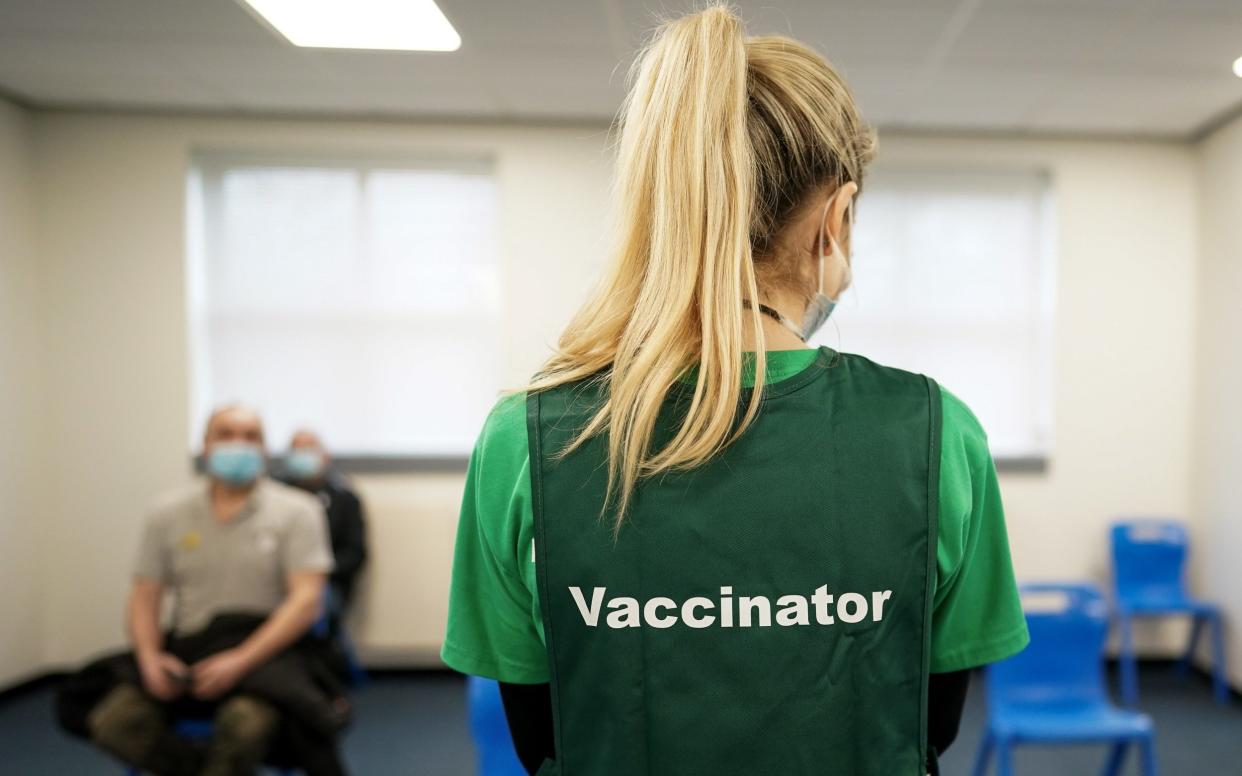Teachers, police and BAME communities will not get Covid vaccine priority

Teachers, police and ethnic groups will not be prioritised in the next round of vaccinations, the Joint Committee on Vaccination and Immunisation (JCVI) confirmed on Friday.
The programme will instead continue by age amid fears that stratifying by occupation or ethnicity would slow down the rollout.
After groups one to nine in the first phase have been completed, including the over-50s and those with underlying health conditions, the rollout will continue in bands of 40 to 49, then 30 to 39 and finally 18 to 29.
It is unclear at present whether children will eventually be included in the programme. Studies are currently ongoing to test the vaccines on youngsters, who were not included in initial trials.
Writing exclusively for The Telegraph, Prof Anthony Harnden, the deputy chairman of the JCVI Covid-19 vaccine sub-committee, said they had chosen to continue with age bands to simplify the rollout.
He warned that prioritising by occupation or ethnicity risked slowing down the vaccination programme and extending the pandemic.
"The evidence continues to show that the older you are, the greater your risk of becoming seriously ill or dying from Covid-19," he said. "Focusing on occupational groups would be more complex, risking slower vaccine delivery to the population as a whole and leaving some higher-risk individuals unvaccinated for longer.
"Our approach will ensure more people are protected more quickly, including those in occupations at a higher risk of exposure.
"Simple and easy to deliver programmes are critical for rapid deployment and high vaccine uptake, which is key to ensuring a quicker route out of the pandemic."
Nearly 19 million people in Britain have now been vaccinated with at least one dose, and the Government is hoping that all adults will have had their first jab by July.
Public Health England (PHE) said modelling studies had shown that the speed of vaccine deployment was the most important factor in maximising benefits and targeting occupations would slow down the programme.
The NHS does not keep occupation on file, so confirming professions would have added an extra level of bureaucracy to the rollout and potentially left more vulnerable people unvaccinated for longer, PHE warned.
Recent evidence shows that teachers in particular are no more likely to be infected with Covid than the general population, although some occupations – such as transport workers – are at much greater risk.
Other people at higher risk of hospitalisation include men, those from black, Asian and minority ethnic (BAME) communities, those with a BMI over 30 and those living in deprived neighbourhoods. The JCVI said priority should be given to promoting vaccine uptake in those groups.
Prof Wei Shen Lim, the Covid-19 chair for the JCVI, said: "The evidence is clear that the risk of hospitalisation and death increases with age. The vaccination programme is a huge success, and continuing the age-based rollout will provide the greatest benefit in the shortest time, including to those in occupations at a higher risk of exposure."
Dr Mary Ramsay, the head of immunisations at PHE, said: "The age-based approach will ensure more people are protected more quickly.
"It is crucial that those at higher risk – including men and BAME communities – are encouraged to take the vaccine, and that local health systems are fully engaged and reaching out to underserved communities to ensure they can access the vaccine."
The JCVI said it would continue to closely monitor the impact of the programme, including vaccine safety, effectiveness and uptake, and update its advice as required.
On Friday the Government launched a major campaign encouraging ethnic minority groups to be vaccinated through dozens of multicultural publications, radio and TV stations which report and broadcast in 14 different languages.
Muslim communities will be particularly targeted in the run-up to Ramandan amid fears that communities will be unwilling to be vaccinated while fasting.
A report published on Thursday suggested that ethnicity itself is not a risk factor, but warned that it often goes hand-in-hand with multi-generational households, poverty and public-facing jobs that raise risk.

